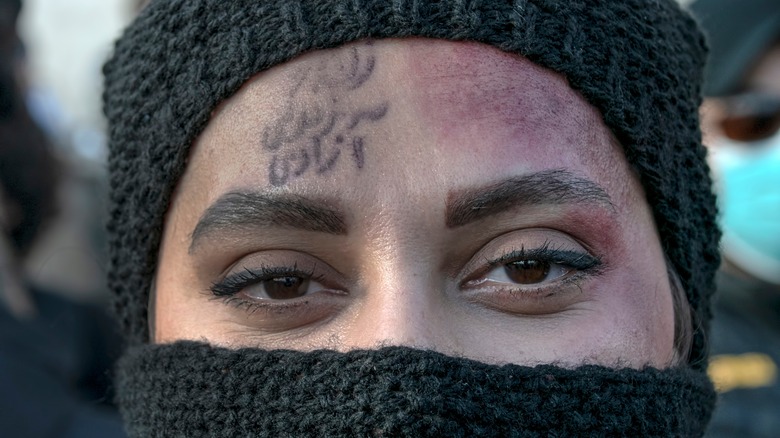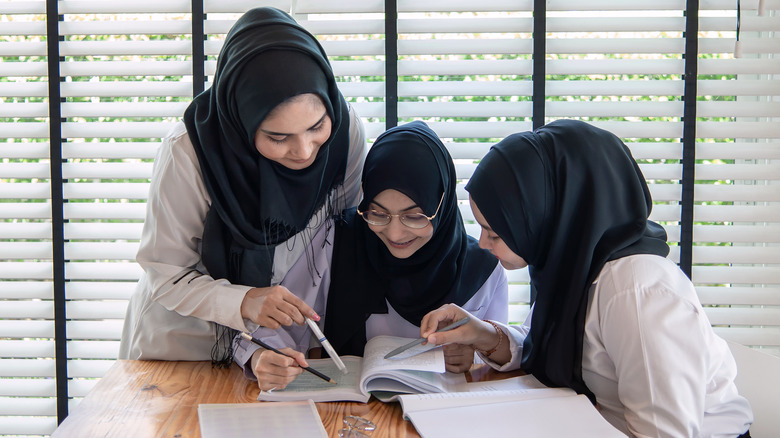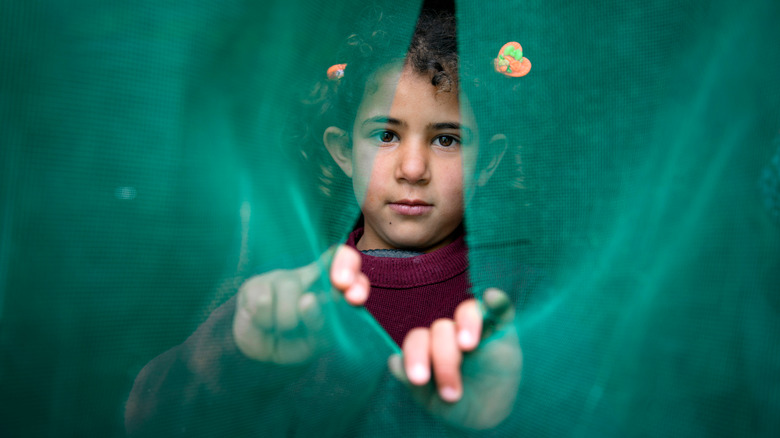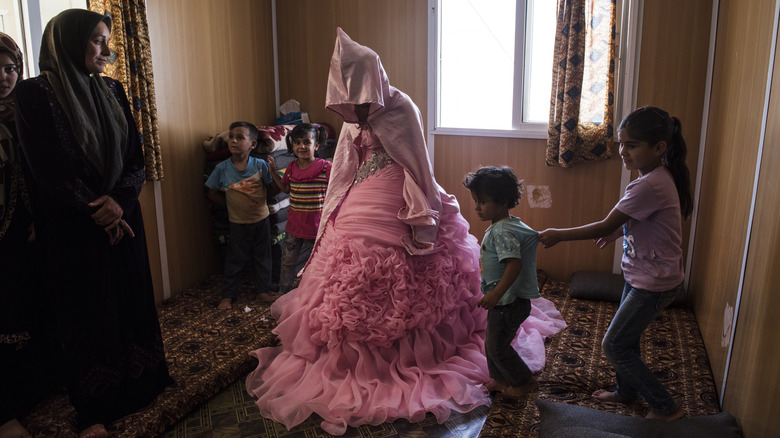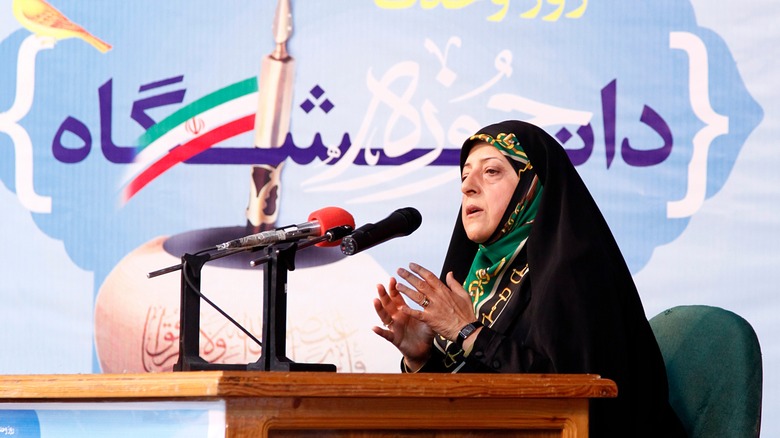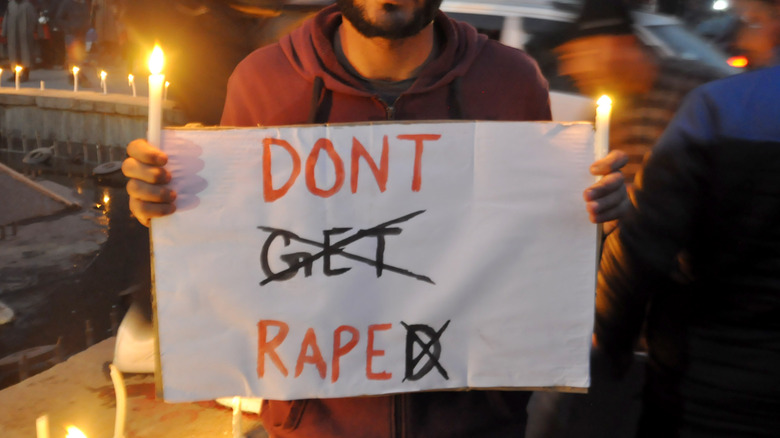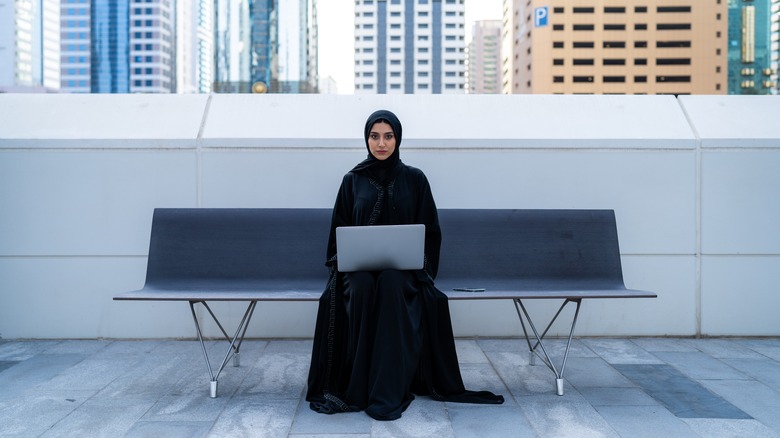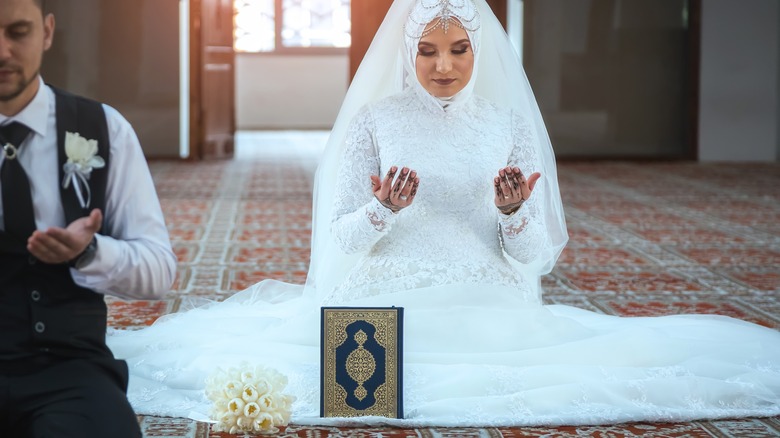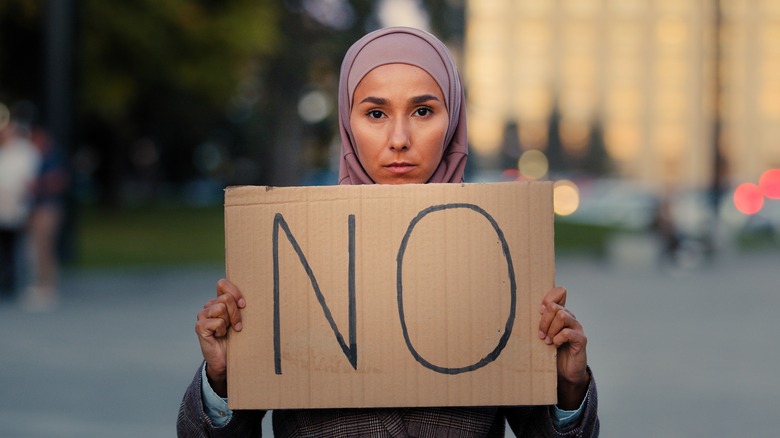How Women's Rights Vary Across The Middle East
The repression of women everywhere in the world is intertwined with the patriarchal system and firmly implanted in state institutions, laws, and mentality. In the Middle East many laws that directly concern women, such as marriage, divorce, child custody and abuse protection laws, are not written in the civil law codes but are based on Sharia law and other religious codes. For this reason, they can't be changed since they don't officially exist. Most countries that do have hybrid legal systems are gradually implementing laws that would grant women rights or protection, explains The Arab Gulf States Institute in Washington.
But the issue is not only in legislation, as stereotypes are firmly implanted in people's minds. The region displays the highest gender bias in the world, as the majority of both men (99%) and women (96%) think women cannot be equal to men when it comes to work, education, and reproductive rights, as per UNICEF.
Women's rights vary across the region in scope as well as in implementation, as law codes are often changing faster than society's customs. While progress has been made, in some places, poverty and conflict still dictate people's daily lives, and women's rights are of secondary importance.
This is how women's rights vary across the Middle East.
The right to education
As per UNICEF, education minimizes the risk of child marriage for girls and their children. It also affects how often women seek help from medical services when it comes to their reproductive health and how they raise their kids -– women who do attend school send their kids to school more often.
According to the Middle East Institute, many Middle Eastern countries have improved access to education for women in recent decades, but there are still vast differences between countries. Bahrain, Kuwait, Oman, Qatar, Saudi Arabia, and the United Arab Emirates legislated equal access to education and are already seeing the results of these policies –- in some places, there are more female graduates than male ones. Along with legislation, these countries heavily invested in health and education public sectors, which helped promote gender equality. Education for children in the UAE is obligatory but free for all. However, schools are strictly segregated by gender. While this is certainly progress, the institute notes that gender roles have not evolved in tandem — women are still expected to juggle and bear the brunt of women's work in the home and family.
But there is a different situation in Yemen, where the majority of 2 million children, who don't attend classes, are girls. As UNICEF details, the most affected are the girls in rural areas — for them, school is often far away, and their parents don't trust the educational system, especially male teachers. Many of them are married off as young as 12 years old –- two thirds of girls in Yemen marry before they turn 18. Without any legal requirements to attend school, girls are often forced into matrimony and subsequent poverty.
Reproductive rights
The World Health Organization (WHO) defines reproductive rights as the basic right to choose freely about having children, which includes autonomous access to health care and information, as per E-International Relations. According to scholars, the Qur'an doesn't outright mention abortion, but it does prohibit infanticide. Even murkier is the idea of "ensoulment," which ascribes a soul to a foetus sometime between 40, 90, or 120 days. While Islamic doctrine allows abortion up to first three months of pregnancy, many Middle Eastern countries have laws against it, based on conservative grounds and stemming from colonial ideas.
Libya, Iraq, Oman, Lebanon, Syria, the UAE, and Yemen allow abortion but only when the life of a pregnant woman is in danger. Under Turkey's law, there are no legal restrictions on abortion before 10-12 weeks, and women don't need to be married or need spousal or parental consent in order to obtain one.
Iran used to have a good reproductive health system until the Iranian Revolution in 1979, when Islamic laws prevailed over the civil ones. Women no longer had free access to abortion, contraception, or sterilization, and abortion was legal only to save the life of a mother. In fact, having children was celebrated and widely encouraged by the new regine. While the population in Iran grew quickly, contraception was reintroduced as early as 1980, and by 1988 its benefits were apparent -– the Iranian population was too big to sustain itself in the post-war economy, so family planning programs became more appealing to the government. Since 2005, abortion is legal In Iran again but only in the first four months of pregnancy and if the foetus is handicapped.
Male guardianship
Male guardianship is widely popular across the Middle East, where women need permission from either their husband or a male relative to access education and health care, and to leave the house or country. A surprising number of Middle Eastern countries do have some personal status civil laws that speak against a woman's need for a male guardian, like Bahrain, Oman, Qatar, Egypt, Jordan, Lebanon, Palestine, Syria, and Yemen, as per UNICEF.
But these laws are often just on paper, like in Qatar, where women still need permission from male relatives to get married, reports The Independent. After she gets married, her husband takes over the role of deciding if she can work, travel, or leave home — and she can't reject sex from him either. Qatari women have reported how they were prevented from emergency health care unless they showed their marriage license first. They can never obtain primary guardianship over their own kids, even after they've gained legal custody rights.
Male guardianship is part of the civil law in Saudi Arabia and Iraq. In Saudi Arabia, male guardians can download a special government app called Absher (available in Google and Apple stores), so they can digitally deny or approve licenses for women to travel abroad. Women were legally treated like minors by law until 2019, when Saudi Arabia did implement some laws, and women can now register births and deaths or obtain family records on their own, decide about their reproductive choices, or travel abroad, at least on paper (via Equality Now).
Child marriage
Child marriage is a massive issue in several countries across the world, and the Middle East is no exception, reports UNICEF. Numerous countries do not have a legal minimum age for marriage, which is often exploited to marry exceptionally young girls. In many cases the minimum age in Sharia or other religious law is much lower than the age in the civil law, as in the case of Jordan -– while the legal minimum is 18 years, judges often make exceptions. People in Yemen see puberty as the right time to get married if you are a female, and different areas in Lebanon have different religious laws about child marriage, due to diversity in denominations.
Saudi Arabia implemented a new law in 2019, reports Reuters, setting the bar for marriage for both genders at 15 years, while an individual needs a permission from a special court if one wants to get married before the age of 18. And here lies the trick, NGO Girls Not Brides warns that parents are capable of appealing to the court in an effort to grant permission.
As ReliefWeb details, Lebanon, Egypt, Turkey, and Iraq have laws that should prevent child marriage, like a legal age limit, but there are many loopholes in these laws. One of the loopholes is temporary marriages — "pleasure" marriages in Iraq and "summer" marriages in Egypt — where older foreigners buy child brides for the extent of their holiday, annulling the marriage when they leave. This practice often affects the poverty-stricken girls and refugees, like Syrian girls in Lebanon.
Political powers and the right to vote
There are big differences between countries when it comes to women and their political power. In some places women took over leading positions in various institutions. Syria, Jordan, Egypt, and Iraq have seen female ministers serving in their governments, while Iran had a female vice president, Masoumeh Ebtekar, between 2017 and 2021, reports the Institute for Policy Studies. Women in these countries, along with Lebanon, got their voting rights sometime between the 1950s and 1970s, while women in Turkey were able to vote and run for office in local elections since the 1930s, as per The New Arab.
Citizens in the UEA went to their first national elections in 2006, and this included men and women, although this was only a small fraction of citizens. Since 2005, women in Kuwait have been able to vote or run for office, as per the Pew Research Institute. While Saudi Arabia doesn't hold national elections, women have been able to vote in local ones since 2015.
Saudi Arabian women can also participate in elections as candidates, but they have to hide behind a barrier when they speak to the public or be represented by a man. In 2015, 130,000 women went to the polls to vote — still a small fraction of the female population in the country (via BBC).
Inheritance, land ownership, and property laws
Not being able to legally own property or being excluded from inheritance affects women's financial independence, which is closely tied to personal freedoms. A new inheritance law was finally passed in 2017 in Egypt, where it states that no one should be denied their inheritance rights, regardless of their gender, reports AL-Monitor. Many women, especially those in rural areas, are tricked out of their inheritance, and others give it up themselves to avoid family conflict.
Land ownership is not a real possibility for the majority of women in the Middle East, explains the Middle Eastern Institute. In countries that rely on agriculture, like Egypt, this problem is even more pressing, since land ownership affects everything from living conditions, to bank loan access, to food security. Only 5% of Egyptian agricultural lands belong to women, and only 3.4% in Jordan. Women in these places still work on fields every day to secure survival, but as hired seasonal labor. Both Egypt and Jordan have property rights in their legislation, but the legislation isn't enforced.
It's similar in Iraq, where 43% of women claimed they have no rights when it comes to property, even though these laws do exist, per The Jerusalem Post. Many women, displaced by war, can't return to their legal homes due to systematic discrimination, returning only to find their houses taken over by male tribal leaders or military.
Rape laws
Several Middle Eastern countries still have exceptions in their legislation that enable perpetrators, who rape a girl or a woman, to avoid punishment if they marry the victim. This legal exemption allows kidnapping, rape, and child abuse if the case ends in marriage, reports Al Jazeera.
These laws are not Islam specific — on the contrary, they were imported from Europe, written in the French Napoleonic Code in 1810. They were transferred to the Ottoman Code a century later, spreading all through the Middle East.
Syria, Kuwait, Iraq, Bahrain, and Palestine still legally allow rape exemptions. Repeal of article 353 was proposed in 2016 in Bahrain but was firmly rejected -– there are ongoing parliamentary discussions that the legal privilege shouldn't be available for those who participate in gang assaults.
Legislation was successfully changed in Lebanon in 2017. Equally fruitful were the campaigns in Jordan, where article 308, permitting legal amnesty to those who marry the victims and stay with her at least three years, was abolished in the same year. But many Jordanians were against this proposal, claiming that the law protects women's honor (via Al Jezeera).
Work rights
Education is highly important for women's employment opportunities, but not many women work in countries in the Middle East, despite their education. According to The Borgen Project, Jordan ranks as one of the worst countries when it comes to female economic participation, where only 15% of employees are female. The biggest challenges for Jordanian women are expensive childcare, a huge pay gap –- men earn between 13% and 15% more –- and the lack of safe transport, along with societal pressures of course.
In countries like UAE, Saudi Arabia, Egypt and Qatar, society has started to encourage women to participate in the workplace, as this statistically improves the economic productivity of the country. The region is poised for what is called the Fourth Industrial Revolution — a period of economic growth marked by innovations in biological, digital, and physical techology (via Salesforce) — that could see the creation of new jobs. Allowing women in the workforce could accelerate that growht. Still, McKinsey's report conducted in UAE, Saudi Arabia, and Egypt show high inequalities in the workspace, especially regarding legal security and financial inclusion.
Women in the UAE still need permission from their husband or guardian to be able to work, and familial conflicts are a big reason why many women stop working. They are limited in their choices, as they are expected to find a job in the public sector, which is perceived as more acceptable for women. As per the Middle Eastern Institute, the entrance of women into the workforce in these Gulf countries didn't really decrease patriarchy, it just transformed it into a modern neo-patriarchal model.
Divorce and marriage rights
Women are not only often coerced into marriage but also prevented from leaving. All through the Middle East, marriage and divorce are often seen as a personal matter, not a civic concern. In many places there are no civil laws that would address marriage, so everything relating to it is left to religious organizations, explains The Century Foundation.
Women can not marry without the consent of a male guardian, and divorce (where is permitted) is often restricted with laws that assign child custody to fathers (via UNICEF).
As per Divorce Science, women can legally divorce in Jordan, Kuwait, Egypt, Turkey, Palestine, and Qatar. In 2010, divorce rates were some three times higher in Jordan than in Qatar and more prevalent in Kuwait and Egypt.
Sometimes restrictions affect a woman's citizenship, as in the case of Saudi Arabia. Both genders have to get official permission if they want to marry a Muslim from outside of Saudi Arabia, but rules are even more pervasive for women –- some demand women to leave their public service jobs if they do, reports The Guardian. Their non-Saudi spouses aren't automatically granted residency and work permits, and the process is very pricey.
Female Genital Mutilation
In the Muslim world, girls are frequently perceived as the keepers of family honor, and any kind of impurity, such as inappropriate behaviour or sexual relationships, stigmatize not only the girl but her whole family. For this reason, virginity is seen as a family matter, and many communities still practice female genital mutilation (FGM). According to E-International Relations, FGM is a practice seen as a way to restrict sexuality in women, as it is perceived as dangerous and destructive.
While the practice is heavily supported by Islamic traditionalists, it is not specifically written in the Islamic code in most countries. Saudi Arabia condemns the practice and sees it as un-Islamic. Egypt, Yemen, and Oman still see high levels of FGM. According to UNICEF, a 12-year-old girl died in 2020 in Egypt during an FGM procedure, where the operation is mostly practiced by medical staff.
The harmful practice was criminalized in 2008 through clauses to the Egyptian Child Act, and, as of 2016, those convicted of the practice are given an automatic sentence of five to seven years in jail. In addition, there is a penalty of one to three years for those who escort the girl to the FGM practitioner.
Honor killings
Britannica defines honor killing as a murder of a female by her male relatives –- daughters, sisters, and mothers killed by their husbands, brothers, and fathers. The reason for murder is a violation of moral codes, like the loss of virginity, sexual immorality, or general defiance.
As per the Middle East Forum, many young Muslim girls are being killed for being "too Western," as they refuse to wear head coverings or desire to pursue education. In half of the documented honor killings the victim was tortured, while motives were most often "sexual impropriety."
Honor killings are often written in Islam religious code, so they take place outside the law -– murders can be presented as accidents in societies that pride themselves as more tolerant to Islamic code, reports Human Rights Watch. Lebanon, where honor killings are not very common, annulled the article in the civil criminal law that minimized the sentence for honor killing perpetrators in 2011. Iraq, Kuwait, Syria, Yemen, Palestine, and Egypt still have legislation that reduces sentences for honor killing cases, while the Jordanian Penal Code pardons those who killed their female relative if she committed adultery, as per Britannica.
Turkey has a high number of honor killings, which count for half of all the murders in the country –- 200 per year, as per the Huffington Post. While the country implemented life-sentence penalties for honor murderers in 2005, the numbers saw no significant change. In fact, a rise in suicides was direclty correlated to the new law. Instead of family members carrying out the murder, the young girls are forced into killing themselves.
